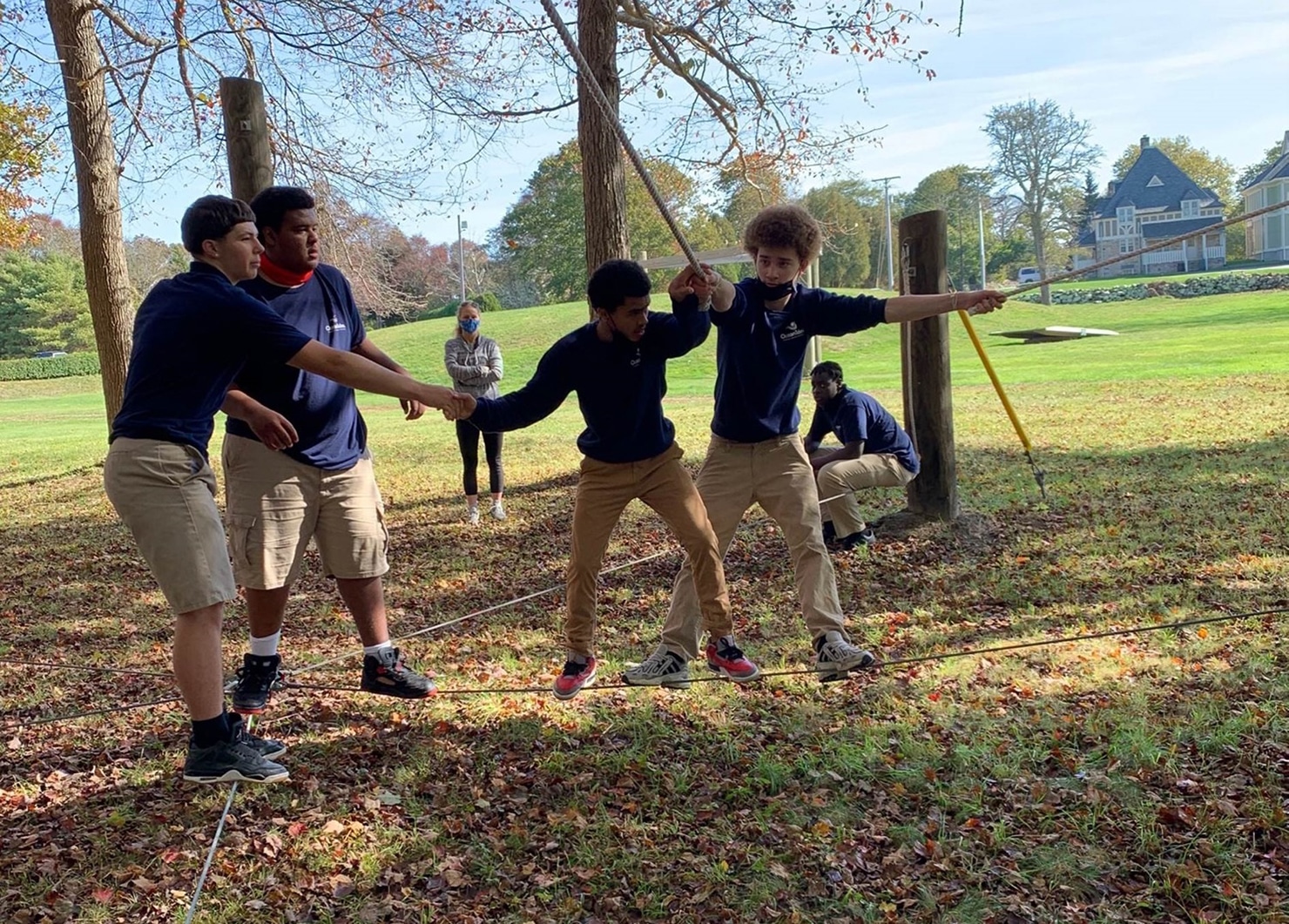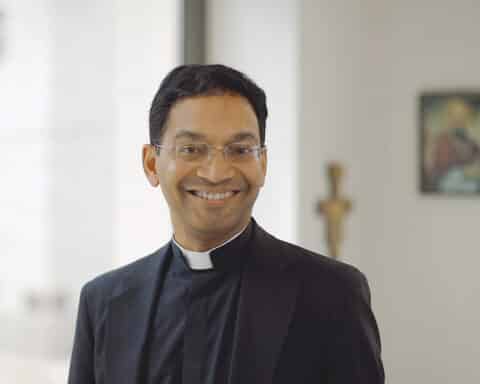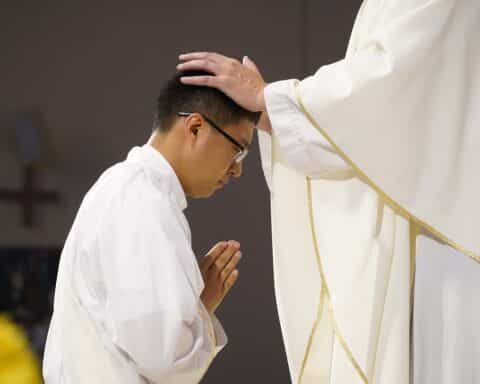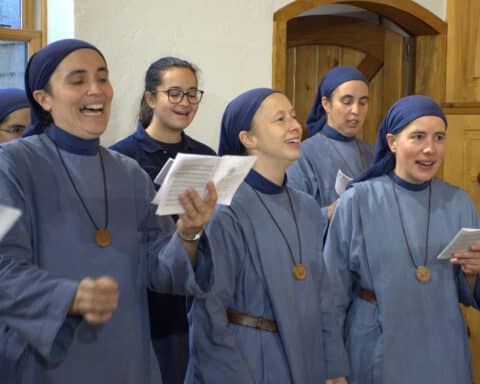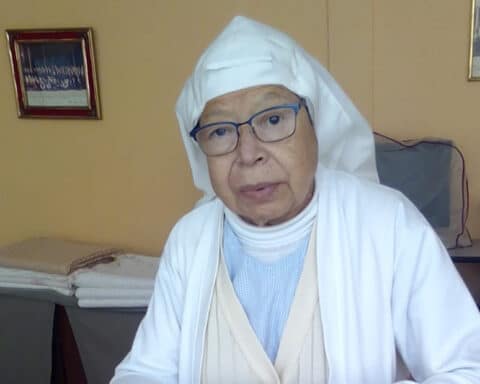For the troubled teenagers they serve in Rhode Island, the Brothers of the Christian Schools strive to be what their name suggests: brothers.
“We take the term ‘brother’ very seriously, that we are called to stand next to, to walk with, to accompany young people in pursuit of Christ, in pursuit of knowledge, and pursuit of truth,” Brother Paul Avvento, FSC, director of the Office of Vocation Ministry, told Our Sunday Visitor.
At Ocean Tides school in Rhode Island, the Brothers of the Christian Schools, also known as the De La Salle Christian Brothers or Christian Brothers, minister to struggling young men at two campuses: the main campus, in Narragansett, and another, in Providence.
The school opened nearly 50 years ago, in 1975, to serve male youth ages 13-18 involved with the juvenile justice system and in need of diversionary counseling or residential treatment.
“Ocean Tides is a Lasallian school and residential program that is committed to providing a challenging, safe and healthy learning environment designed to meet the social, emotional, behavioral, and intellectual needs of each individual,” Brother Paul, who previously taught there, described.
The brothers, founded by St. John Baptist de La Salle in the 17th century to provide educational opportunities for boys of poor or working-class families, sponsor the school. Today, De La Salle schools serve in 79 different countries worldwide.
Open doors
At Ocean Tides, both campuses present distinctive opportunities: a positive behavior program and positive behavioral supports, a small-class environment, individualized instruction based on IEPs (Individualized Education Plans), individual or group counseling, and career study or experience.
Among other things, the school offers on-site employment, real-world internships, and vocational or trade education, including in culinary arts, carpentry and woodworking, landscape design, engineering and technology.
Ocean Tides, Brother Paul highlighted, stands out from other, similar institutions in its approach. The staff and brothers interact with these young men not only as students but also as human persons. Caring for these teenagers is more than a job; it’s a calling.
“We’re what’s called a non-restraint or a non-secure facility, in the sense that none of our doors are ever locked from the inside. Our staff is not allowed to restrain students if they are attempting to leave.”
— Brother Paul Avvento
“We’re what’s called a non-restraint or a non-secure facility, in the sense that none of our doors are ever locked from the inside,” Brother Paul said. “Our staff is not allowed to restrain students if they are attempting to leave.”
Similar, alternative settings, he said, often resemble what people think of as a detention center.
“Since our founding, we’ve really felt that that’s not the way to transform hearts,” he said. “So if a student tries to leave, we will walk with them, we will talk with them, we will do everything we can to reason and persuade or whatever else it might be and remind them of the consequences that they risk facing. But at the end of the day, it’s their choice.”
This approach, he said, makes a drastic difference in students’ sense of agency and respect.
A student-centric focus
Brother Paul shared the similarities and differences between campuses.
The Narragansett campus — a 24/7, 365-day school and residential program — welcomes young men involved in the juvenile justice system. The Providence campus, which serves strictly as a school, educates teenagers referred from school districts for IEP services, small class sizes and individual attention.
“Ocean Tides youth experience significant levels of trauma and disrupted development, and the program tries to help fill in some of those gaps through its caring and supportive environment and educational, recreational and career development opportunities,” he said.
Everyday Catholics can help in this mission, he said. This fall, they will hold a car show on Oct. 14 and an annual fundraiser on Oct. 20 in Narragansett. The school will also organize a cookie fundraiser beginning on Oct. 23, where people can purchase cookies made by students. Catholics can also donate online at www.oceantides.org.
A brother’s role
Unlike years past, no brothers currently hold formal assignments at the school. But, Brother Paul said, the brothers today serve as mentors and walk with the young men in a special way.
He pointed to the beauty of the Narragansett campus sharing property with the Christian Brothers Center, which houses retired and active brothers.
“Even when brothers aren’t in the school in formal roles, they are constantly interacting with students,” he said, from eating together to sharing conversations.
He stressed the importance of students benefiting from interacting with people who, in their eyes, are not forced to care about them. Instead, they see the brothers freely choosing to accompany them.
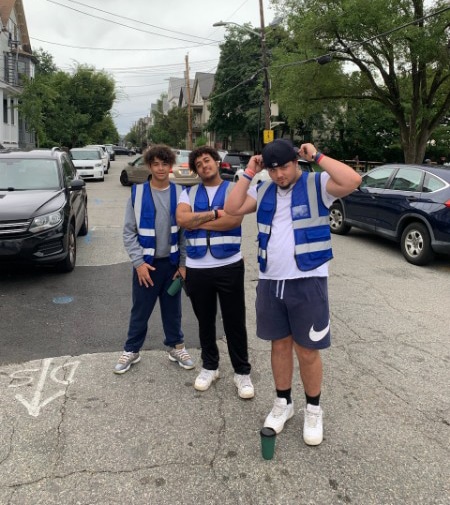
A vocation
Brother Paul first encountered the brothers as a student at Manhattan College, a Lasallian Catholic college in Riverdale, New York.
“I was studying education and I was drawn to the brothers, the way they taught, the way they interacted with the students,” he said.
After graduating, he spent seven years working in one of the brothers’ schools in San Francisco while struggling with his vocation.
“I have never put more effort into anything as I did fighting my [religious] vocation throughout my 20s,” he said. “I think deep down, I knew it and everyone I worked with [knew it].”
“I stopped seeing vocation as ‘What is God calling me to do?,’ and I started seeing it as ‘Who was God calling me to be?'”
— Brother Paul Avvento
At the same time, he said, he felt called to marriage and family life. He reasoned that he was already doing the same work as the brothers. Then, his approach changed around when he turned 30.
“I stopped seeing vocation as ‘What is God calling me to do?,’ and I started seeing it as ‘Who was God calling me to be?'” he remembered.
“Once I started seeing it as ‘Who is God calling me be?,’ I realized I cannot be the person of faith, the person of presence, of accompaniment, of true Christian relationship with others, without being a brother — without experiencing the presence of God and community every day with my fellow brothers and then sharing that gift with my students and then bringing my students back into prayer with my brothers.”
“That kind of life is the life that I needed to live,” he concluded, “to be who God was calling me to be.”
A teaching brother
Brother Paul called his time at Ocean Tides, for nearly a year-and-a-half, his most brotherlike experience. He began teaching right before the COVID-19 pandemic hit, in February of 2020.
With some teachers, counselors and other staff no longer able to serve at the school, due to being at-risk or needing to care for their families, Brother Paul jumped in to teach multiple subjects (social studies and physics) as well as serving in the school’s group-living environment outside of class, from playing basketball to holding video game tournaments.
| Join the mission |
|---|
|
This fall, the Christian Brothers will hold a car show on Oct. 14 and an annual fundraiser on Oct. 20 in Narragansett. The school will also organize a cookie fundraiser beginning on Oct. 23, where people can purchase cookies made by students. Learn more or donate online at www.oceantides.org. |
He shared one of his favorite things to witness while teaching there: seeing the students engaged in something so enjoyable or innocent that they dropped the guard many of them have been forced to carry since a young age.
“Because they are so accustomed to being hurt by the world, by the people who are closest to them, that to open up and to just enjoy something or be innocent or vulnerable, for many of them, is the worst thing you could do,” he explained. “And yet these moments where you would see the smile, that, it’s like, they’re still kids.”
“In those moments,” he said, “it’s just beautiful.”

